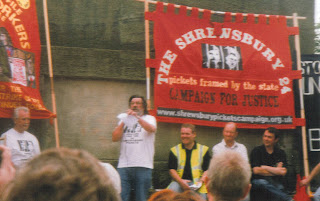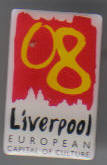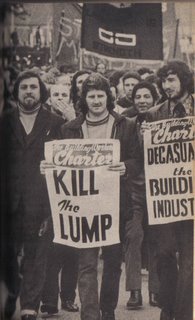A Challenge to the Slanderers

WORKING CLASS HERO still seems to upset some people eight years after he died.
FORMER building worker Des Warren died eight years ago, on April 24, 2004, after years of illness, a shadow of his former self, due to drugs administered him in prison bringing on a severe form of Parkinson's Disease.
Des, a steel fixer by trade, had been jailed for three years for his part in the 1972 builders' strike, when he fought for a £1 an hour minimum wage, and against the notorious "lump" system, which enabled employers to evade legal responsibilities for insurance, and health and safety, and to undermine trade unionism in the industry, by paying workers a lump sum and pretending they were self-employed.
During the strike Des Warren, Ricky Tomlinson (now a famous actor) and colleagues from North Wales and Chester took a bus to Shrewsbury, touring sites there and in nearby Telford new town, to persuade men still working to come out and join them. During that visit they were accompanied by police wherever they went. Nobody was arrested. In fact, as Ricky Tomlinson recalls, a senior police officer congratulated the pickets at the end of the day on the way their effort had been conducted!
Months after the strike had ended police acting on orders from Tory Home Secretary Robert Carr were sent to North Wales and Chester and two dozen men were rounded up from their homes and taken to Shrewsbury to face trial. They were charged with "conspiracy". At his trial, Des Warren told the court there had been a conspiracy - between the government, the police and the employers. He was sentenced to three years, Eric Tomlinson as he then was got two years, and others received suspended sentences, among them Terry Renshaw (four months) who would go on later to become mayor of Flint.
There was a campaign to free the Shrewsbury Two, but it received scant support from the builders' union UCATT, or the TUC, especially after Labour had become the government and Home Secretary Roy Jenkins refused to consider it. As Ricky Tomlinson points out, "We ended up spending more time in jail under Labour than we had under the Conservatives". After his release he joined those campaigning for Des Warren to be freed, and tried to address the TUC in Blackpool, but was denied a platform. He and his companions had to listen to a speaker denouncing the pickets, and were thrown out of the public gallery when they protested.
Des Warren, who had been in the Communist Party, switched to the Workers Revolutionary Party after his release. The WRP published his book, The Key To My Cell, about his experiences. It pulls no punches about his persecutors and those who let him down politically, but does give credit where due to people who had tried to help him. Though I did see Des Warren at an event in Brixton after the WRP split in the 1980s, his chronic illness made it impossible for him to keep up public activity, and he increasingly came to need convalescence and nursing.
For some years now there has been a campaign to have the Shrewsbury convictions squashed and the pickets' names cleared. The Justice for Shrewsbury 24 campaign has held marches in Shrewsbury and mass meetings in London, it has lobbied MPs at Westminster and demanded that the government release documents and material information about the trial which remains hidden in the interests of so-called "national security".
As a contribution to the campaign and to educating new generations, Des Warren's The Key to My Cell was republished a few years ago, and members of the Warren family have played a part in campaigning. Along with militants involved in the original campaign in the 1970s march comrades who were not even born then , and members of both building unions, Unite and UCATT. Ricky Tomlinson is a supporter of Arthur Scargill's Socialist Labour Party and the former miners' leader has spoken at campaign meetings. So has Bob Crow of the RMT. Others involved include Labour and Communist Party members, former members of the WRP, activists in the Trade Union and Socialist Coalition, and others simply concerned with defending workers' rights and fighting injustice.
Yet some people who call themselves trade unionists don't seem happy about this campaign, and beneath the genuine unity and enthusiasm it has aroused, there seem to be some out to divide and undermine it. Rather than open opposition, this takes the form of smears and rumour-mongering aimed at sapping confidence, and it would be interesting to know where this is coming from. Apparently one of the targets attacked is Des Warren's book, and thus its author, who it is suggested wasn't capable of expressing his own experiences and thoughts, but was just some kind of stooge for outside forces. It says something for Des Warren and his book that they can still awaken such antagonism, and it says a lot about his detractors that they have waited so long to smear someone who is dead, and even now are too cowardly to come out into the open.
Anyway, I am pleased to see that journalist Chris Corrigan, who worked with Des on the book and whom I know as a man of quiet and decent integrity, has decided to reply to this smear, and here, with an introductory letter from Gerry Downing, is Chris's statement, as it appears in
Weekly Worker 914 , Thursday May 17 2012
Chris Corrigan sets the record straight about Des Warren
The ideals fought for by Des Warren and his comrades during and after the 1972 building workers’ strike need to be clearly restated. By far the best way to honour the memory of those who were surely amongst the foremost class warriors of the last century is not simply to legally ‘clear the names’ of the falsely criminalised and jailed Shrewsbury pickets, but to organise to finish the fight against the ‘lump’, which led them into sharp conflict not only with the building employers and Tory government of the day, but also with the Ucatt union bureaucracy, the TUC cowards and their apologists.
Des is very clear in his book, The key to my cell, that it was these latter three who held that key, which they refused to turn in order to maintain their rotten, corrupt, class-compromise positions of defending capitalism as the source of their privilege.
Following divisions in the Justice for the Shrewsbury Pickets campaign, allies of these have attempted to undermine the authenticity of Des’s book. A rumour has been spread that the book was not really Des’s work at all or that in writing it he was ‘spoon-fed’ by the Workers Revolutionary Party, which organisation he joined after he was released from jail. Here, the record is set straight by Chris Corrigan, who assisted Des in the production of the book.
Gerry Downing
I am a life member of the NUJ and have been a journalist for 48 years. For the past three I have been a contract sub-editor at The Guardian newspaper. Prior to that I was a staff sub-editor at The Independent for 22 years.
Previously I was a news reporter on the Western Mail, then the Birmingham Post, and then, from 1969 to 1974, in Fleet Street with the Press Association news agency, where I was a high court and central criminal court/Old Bailey reporter. Needless to say, you require very high skills in shorthand for such tasks, in terms of accuracy and speed. In fact, I still have my Pitman’s shorthand certificates from the 1960s.
It was these shorthand skills that led to me to cover the appeal court case in the Strand, where Des and Ricky Tomlinson were seeking to overturn their Shrewsbury convictions. I got talking to Des during the many lunch breaks and adjournments - they were temporarily out on bail - and liked him enormously. Any trade unionist would - he was an extremely impressive man with very high principles which he powerfully expressed. No wonder employers did not like him.
By this time I resigned from the PA, which was increasingly departing from its traditional role as an impartial national news agency and joining in the general rightwing media campaign: eg, against the early-70s miners’ strikes and vilifying so-called dossing, card-playing, night-shift workers at Cowley and Longbridge. I worked freelance, and contributed news stories to various papers as well as, when possible, to the Workers Press, the WRP’s paper. I eventually joined the WRP in early 1975, when the Americans had to leave Saigon in a hurry.
I also got to know Des’s family, including Elsa, who worked tirelessly, speaking for the Shrewsbury campaign to free Des and his fellow defendants. As is known, their appeal was rejected.
After Des’s eventual release from jail, I kept in touch. He was anxious to bring out a book about his experiences. I offered to put my shorthand skills at his disposal - it must be emphasised he was unable to hold a pen still for even a second, or use a typewriter, because of his continuous shakes from the onset of Parkinson’s disease brought on by prison authorities administering Largactil and other heavy tranquilisers. (Largactil was later superseded by drugs which did not cause the same level of side-effects, which continual large doses often brought about.)
So Des needed help to write his book. When he was ready, and when I was available, I spent six weeks with him, sometimes staying at his house in Buckley, North Wales, or travelling by moped each day from Runcorn.
It went like this. Des spoke - I recorded what he said. Each night I would transcribe my shorthand notes onto printed sheets. These proofs would be checked by Des. We eventually had a full manuscript. After about a fortnight, I returned and Des had gone through the manuscript and made additions and changes during the next two weeks. He was ill, but his mind was still sharp, as was his memory, and he had full control of the content - every sentence of it. Nobody else except Des contributed to, or had any control, over its content. He wrote it - even the title, The key to my cell.
My role was as shorthand writer and secretary, and also as a researcher when dates and times needed checking or court transcripts and newspaper cuttings needed finding. All of which Des collated and chose where to insert in the book.
Finally, if anyone wants to challenge the integrity of the above account they can face the consequences or I am willing to meet them to sensibly discuss it. This includes Mr Terry Renshaw - if he is able to absent himself from his work as a highly active member of the North Wales Police Authority, which, in a previous form, helped put Des, Ricky and others behind bars in the first place.
To order copies of the book contact justice4pickets@yahoo.co.uk
Chris Corrigan
Further reading:
http://www.independent.co.uk/news/obituaries/des-warren-6170658.html
http://www.guardian.co.uk/news/2004/may/01/guardianobituaries.politics
http://www.catalystmedia.org.uk/issues/misc/reviews/key_to_cell.php
Video:
http://www.youtube.com/watch?v=g47X53TtkVE
Legal News:
http://www.flintshirechronicle.co.uk/flintshire-news/local-flintshire-news/2012/04/05/step-forward-in-flintshire-workers-fight-against-injustice-51352-30693575/
Labels: Books and Writers, building, Des Warren, trade unions









